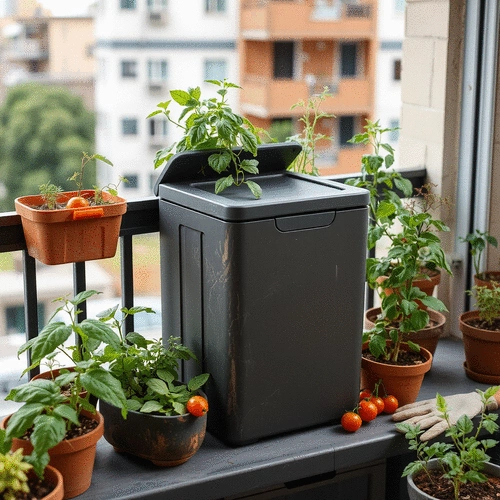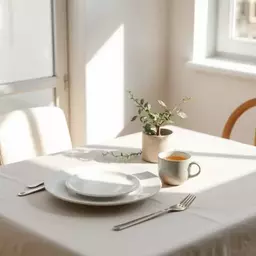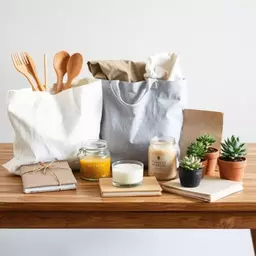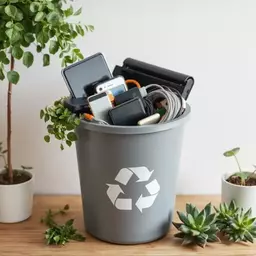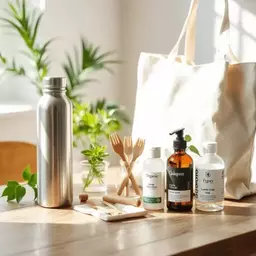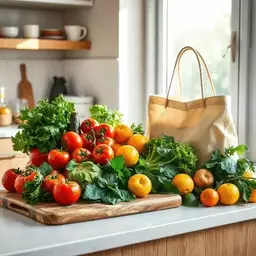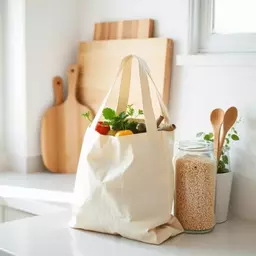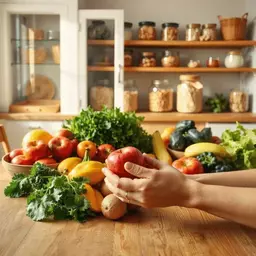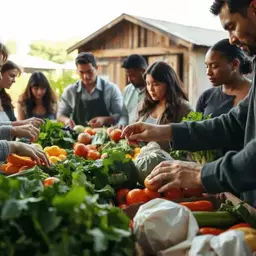Composting is not just for those with sprawling gardens; it's a sustainable practice that can thrive even in the tiniest of spaces. Imagine transforming your kitchen scraps into rich soil right from your balcony or kitchen counter! This guide will arm you with insights and practical methods to successfully compost, no matter where you live.
What You Will Learn
- Composting reduces waste and lowers your carbon footprint by diverting organic materials from landfills.
- Homemade compost significantly improves soil health, enhancing moisture retention and nutrient availability for plants.
- Compact composting options such as worm bins and bokashi systems make composting easy and convenient in small spaces.
- Using finished compost as a natural fertilizer can lead to healthier plants and increased crop yields over time.
- Regularly monitoring soil health helps you gauge the effectiveness of your compost and adjust your gardening practices accordingly.
- Engaging with community composting initiatives can amplify your impact and inspire others to adopt sustainable practices.
Cost Analysis of Small-Space Composting Systems
Evaluating the initial setup costs for various composting methods can help you choose the most suitable option for your space. For more strategies on managing waste, explore our guide on eco-friendly junk removal.
Worm Composting
Initial setup: $50 to $100.
This method yields nutrient-rich compost over time.
Bokashi System
Initial setup: $50 to $80 for a starter kit, with ongoing supplies needed.
Compost Tumblers
Initial setup: $100 to $300, depending on size and features.
Cost-Effectiveness Summary
Composting saves on fertilizers in the long run while reducing waste and supporting a healthier planet.
Understanding Composting in Limited Spaces
Composting is a fantastic way to turn kitchen scraps and yard waste into nutrient-rich soil for your plants. Even if you live in a small apartment or have limited outdoor space, you can still embrace this eco-friendly practice! At Eco Habits Daily, we believe that no matter where you live, everyone can take steps toward a more sustainable lifestyle, and composting is an excellent starting point.
Exploring the Benefits of Composting in Small Areas
Composting in limited spaces has a plethora of benefits that not only enrich your garden but also contribute positively to the environment. Here’s why you should consider composting in your small area:
- Reduces Waste: Composting helps divert waste from landfills, reducing your carbon footprint.
- Improves Soil Health: The compost you create is full of nutrients that enhance soil quality.
- Cost-Effective: By recycling your organic waste, you’ll save money on fertilizers and soil amendments.
Additionally, composting can be a rewarding part of your gardening journey! You’ll find that nurturing your plants with your homemade compost fosters a deeper connection to nature and your community. For further inspiration, consider these easy eco-friendly habits to start.
Environmental Impact: Reducing Waste and Improving Soil Health
Did you know that composting can significantly cut down on your household waste? When organic materials like fruit peels and vegetable scraps decompose naturally, they help create a healthy ecosystem in your garden. This process not only keeps these materials from heading to the landfill but also reduces harmful greenhouse gas emissions!
Moreover, compost enriches the soil, improving its structure and fertility. It holds moisture better, which means you’ll need to water less often, saving both water and effort. It’s a win-win situation for both your plants and the planet!
Convenience in Urban Living: Composting Options for Apartments and Balconies
Living in an urban area or a small space can seem like a barrier to composting, but there are plenty of solutions designed just for you! Here’s a look at some convenient composting options for apartments and balconies:
- Worm Bins: These compact bins can fit right in your kitchen or balcony and effectively break down food scraps with the help of worms.
- Bokashi Systems: This method uses fermentation to compost food waste, making it perfect for those with limited space.
- Compost Tumblers: These are easy to use and can fit in small areas, allowing for efficient composting without the mess.
By choosing one of these methods, you can easily integrate composting into your lifestyle, no matter how limited your space might be. It’s all about finding what works best for you and your home!
Practical Composting Methods Tailored for Small Spaces
Now that we’ve discussed the benefits of composting in limited spaces, let’s dive into some practical methods that can help you get started! Remember, every small step counts towards a more sustainable future.
Pro Tip
Did you know? To enhance the efficiency of your composting process, regularly aerate your compost pile by turning it every few weeks. This helps speed up decomposition and ensures that your compost remains well-oxygenated, promoting beneficial microbial activity. A well-aerated compost pile can break down materials more quickly, allowing you to enjoy nutrient-rich compost sooner!
Long-term Benefits and Yield Expectations from Small-Space Composting
Composting in small spaces offers not just immediate benefits but also long-term advantages that significantly enhance your gardening efforts. When you choose to compost, you are essentially enriching the soil with organic matter, which can lead to healthier plants and improved crop yields. Here at Eco Habits Daily, I often hear from readers about the transformation they experience in their gardens after incorporating compost into their routine!
One of the most exciting aspects of composting is how it contributes to soil amendment. Finished compost acts as a natural fertilizer, providing essential nutrients that support plant growth. Over time, you'll notice that your plants thrive better and produce more fruits, vegetables, and flowers. It’s a beautiful cycle, where your compost enhances the soil and helps your plants flourish.
Understanding Soil Amendment and Usage
Knowing when and how to use your finished compost is key to maximizing its benefits. Typically, you’ll want to wait until your compost has fully decomposed, turning dark brown and crumbly. Here are a few tips on usage:
- **Top Dressing**: Apply a layer of compost on top of your soil to enhance nutrient availability.
- **Mixing with Soil**: Blend compost into the soil before planting to give your plants a strong start.
- **Compost Tea**: Steep compost in water to create a nutrient-rich tea for watering your plants.
Monitoring your soil’s health is another crucial step. Regularly checking your soil’s texture and nutrient levels can help you understand how well your compost is working. You can even consider testing your soil every year to see improvements! For other ways to improve your home's sustainability, check out these recycling tips for your home.
When and How to Use Your Finished Compost
Using your finished compost is all about timing. Seasonally, you should aim to enrich your soil before planting or during the growing season. Ideally, here's how to approach it:
- **Spring**: Incorporate compost into your garden beds as you prepare for planting.
- **Summer**: Use compost tea to nourish your plants throughout their growing phase.
- **Fall**: Spread compost as a mulch to protect your soil during winter.
This approach not only benefits your plants but also improves your soil’s structure and moisture retention, leading to a more sustainable gardening practice!
Monitoring and Improving Soil Health Over Time
Keeping an eye on your soil health is essential in your composting journey. Regularly observing the results of your compost application will show you how your soil is evolving. Here are some indicators to watch for:
- **Plant Growth**: Are your plants growing taller and healthier?
- **Soil Structure**: Check if the soil is crumbly and holds moisture.
- **Microbial Life**: Look for signs of earthworms and other beneficial organisms.
As you continue composting, you may find yourself more in tune with your garden's needs. Trust me, it's incredibly rewarding to see the fruits of your labor thrive thanks to your enriching compost!
Taking the Next Steps in Your Composting Journey
Now that you're familiar with the long-term benefits of composting, it’s time to take the next steps! Understanding the costs associated with various composting methods will help you choose the best option for your space. Remember, at Eco Habits Daily, we’re all about making sustainable living accessible and practical!
Comparative Cost Analysis of Small-Space Composting Systems
When considering different composting systems, it’s essential to evaluate their cost-effectiveness. Here’s a quick breakdown:
- **Worm Composting**: Initial setup can range from $50 to $100, but it yields nutrient-rich compost over time!
- **Bokashi System**: Costs vary between $50 to $80 for a starter kit, with ongoing supplies needed.
- **Compost Tumblers**: Prices can be between $100 to $300, depending on size and features.
While the upfront costs may differ, remember that composting saves you money on fertilizers in the long run. Plus, it reduces waste and supports a healthier planet!
Evaluating the Cost-effectiveness of Different Methods
When evaluating your options, consider both the short-term and long-term savings. Here’s what you should keep in mind:
- **Waste Reduction**: Composting diverts organic waste from landfills.
- **Natural Fertilizer**: Compost reduces the need for chemical fertilizers, saving you money.
- **Soil Improvement**: Healthier soil leads to better plant yields, which can save on grocery costs!
By investing in composting, you’re not just enhancing your garden; you're also making a wise financial decision for your household!
DIY vs. Commercial Composting Solutions
Choosing between DIY composting solutions and commercial options can be daunting. Here’s a brief comparison to help you decide:
- **DIY Solutions**: Cost-effective and customizable but may require more time and effort.
- **Commercial Systems**: Easier setup and maintenance, but at a higher initial cost.
Your choice may ultimately depend on your budget, space availability, and how hands-on you want to be in your composting journey!
Engaging with Your Community and Sharing Success Stories
One of the joys of composting is sharing your experiences with others! Engaging with your community can foster a sense of connection and support. Here’s how to get involved:
- **Join Local Composting Groups**: Share tips and learn from others!
- **Participate in Workshops**: Many communities offer composting workshops for beginners.
- **Start a Neighborhood Composting Initiative**: Encourage others to join in on the composting fun!
At Eco Habits Daily, we love hearing about your composting success stories. We’re all in this together!
Case Studies: Successful Small-Space Composters
Seeing real-life examples can be incredibly inspiring! Here are a few case studies to motivate your own composting journey:
- **Apartment Composter**: A city dweller turned a kitchen corner into a thriving worm composting setup!
- **Community Garden**: Neighbors pooled resources to create a shared composting station, enriching their local garden.
- **Bokashi Success**: An urban gardener used bokashi to break down kitchen scraps in tight quarters, helping plants flourish!
These stories show that no matter your space, composting is achievable and rewarding!
Encouraging Community Involvement in Composting Initiatives
By encouraging your community to get involved, you promote a sustainable culture. Consider organizing events to raise awareness about composting or collaborate with local businesses to provide composting resources. Here’s how to get started:
- **Host a Community Composting Day**: Gather neighbors to learn about composting together!
- **Create Informational Flyers**: Share tips and benefits to inspire others.
- **Leverage Social Media**: Use platforms to spread the word and celebrate your community’s efforts!
Remember, every action counts and can lead to a more sustainable future for everyone!
Final Thoughts and Resources for Aspiring Composters
As we wrap up this composting journey, remember that your efforts can make a significant difference in both your gardening success and the environment. Here at Eco Habits Daily, I'm thrilled to support you every step of the way!
Common Questions and FAQs on Small-Space Composting
It’s natural to have questions as you embark on your composting adventure. Here are some common inquiries:
- **What materials can I compost?**: Most kitchen scraps, yard waste, and even certain paper products are compostable!
- **How long does it take to make compost?**: Depending on the method, it can take anywhere from a few weeks to several months.
- **Can I compost in winter?**: Yes! Composting can continue year-round with the right setup.
Don’t hesitate to reach out for more detailed answers as you dive into your composting journey!
Answers to Frequently Asked Questions about Techniques and Equipment
Many aspiring composters wonder about the best techniques and equipment. Here are key insights:
- **Worm Composting vs. Bokashi**: Worm composting is better for longer-term scraps, while bokashi is great for quick fermentation.
- **Compost Tumblers**: These are effective for quicker decomposition but require regular turning.
- **DIY Options**: Building your compost bin can be a fun project and often cheaper than buying ready-made systems.
Remember, it’s all about finding what works best for you and your space!
Where to Find Additional Composting Resources and Support
If you’re looking for more support, countless resources can guide you along the way. Here are some places to check out:
- **Local Gardening Clubs**: They often host workshops and provide valuable community support.
- **Online Forums and Blogs**: Websites like Eco Habits Daily offer tips and success stories from fellow composters.
- **Books on Composting**: There are excellent guides that can deepen your understanding of composting methods.
Embrace the adventure of composting! Each step you take contributes to a healthier planet and a flourishing garden. I'm excited to see where your composting journey leads you! For more comprehensive advice on reducing your overall waste, take a look at these simple low-waste lifestyle tips. 🌱
FAQs on Small-Space Composting
- Q1: Can I compost even if I live in a small apartment?
- A1: Absolutely! There are many compact composting options like worm bins, Bokashi systems, and small compost tumblers specifically designed for urban living and limited spaces.
- Q2: What are the main benefits of composting in a small area?
- A2: Composting in small spaces helps reduce waste, improves soil health by creating nutrient-rich compost, and is cost-effective as it lessens the need for commercial fertilizers. It also fosters a deeper connection to nature.
- Q3: What types of composting systems are best for small spaces?
- A3: Worm bins (vermicomposting) are excellent for breaking down food scraps, Bokashi systems use fermentation for quick composting, and compact compost tumblers offer efficient decomposition with minimal mess.
- Q4: How does composting impact the environment?
- A4: Composting significantly reduces landfill waste and greenhouse gas emissions. The resulting compost enriches soil, improves water retention, and supports healthier plant growth, benefiting both your garden and the planet.
- Q5: When and how should I use my finished compost?
- A5: Apply compost in spring for planting, use compost tea in summer to nourish plants, and spread it as mulch in fall to protect soil during winter. Ensure the compost is dark brown and crumbly before use.
- Q6: What is the cost range for small-space composting systems?
- A6: Initial setup costs vary: worm composting ($50-$100), Bokashi systems ($50-$80 for a starter kit), and compost tumblers ($100-$300). While there's an upfront cost, it saves money on fertilizers long-term.
- Q7: How can I monitor and improve my soil health with compost?
- A7: Observe plant growth, check if the soil is crumbly and holds moisture well, and look for signs of microbial life like earthworms. Regular soil testing can also help track improvements caused by compost application.
- Q8: What materials are suitable for composting?
- A8: Most kitchen scraps (fruit/vegetable peels), yard waste, and certain paper products are compostable. Avoid meat, dairy, and oily foods in small-scale systems to prevent pests and odors.
Recap of Key Points
Here is a quick recap of the important points discussed in the article:
- Environmental Benefits: Composting reduces waste, improves soil health, and lowers your carbon footprint.
- Convenient Methods: Options like worm bins, Bokashi systems, and compost tumblers make composting feasible in small spaces.
- Soil Health: Finished compost enhances soil structure, fertility, and moisture retention, leading to better plant growth.
- Application Timing: Use compost in spring for planting, summer for nourishment, and fall as mulch to protect soil.
- Community Engagement: Join local composting groups and share your success stories to inspire others.
- Cost-Effectiveness: Evaluate different composting systems for both short-term and long-term benefits in reducing waste and fertilizer costs.

